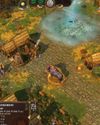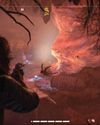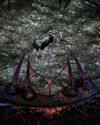
My tiny Cessna light aircraft is barrelling down the terrifyingly short runway at Lukla, an airport nestled in the mountains of eastern Nepal that’s said to be one of the most dangerous in the world. The end of the runway approaches fast as I yank back on the yoke, but I’m not getting any lift. I resign myself to my fate, but half a second before I slam into the barrier separating Lukla from the misty void below, the little plane lurches into the air and suddenly I find myself soaring down a deep, vast Himalayan valley scattered with little fluffy clouds.
Ten minutes later I’m flying over New York City, a dense urban sprawl that stretches as far as the eye can see, sunlight glinting off the skyscrapers. Then I’m above my hometown of Glasgow, Scotland in the thick of a torrential rainstorm. I can see the streets where I grew up below me. Then I’m somewhere over the Sahara. The Jökulsárlón glacier in Iceland. The lush valleys of New Zealand. Mount Fuji in Japan. Anywhere I can think of I can go because in Microsoft Flight Simulator the entire world is literally at your fingertips.
It seems unbelievable, but as I spin a 3D globe around I realize that I can drop my plane anywhere on Earth and, after a short loading screen, start flying. This is possible because the game generates its world using satellite data pulled from Bing Maps. But you aren’t just flying over a flat texture: the engine takes this map data then intelligently fills it in with trees, water, buildings, famous landmarks, and even little details such as traffic on the roads. Elevation is rendered accurately too, resulting in towering mountain ranges and yawning valleys.
この記事は PC Gamer の December 2019 版に掲載されています。
7 日間の Magzter GOLD 無料トライアルを開始して、何千もの厳選されたプレミアム ストーリー、9,000 以上の雑誌や新聞にアクセスしてください。
すでに購読者です ? サインイン
この記事は PC Gamer の December 2019 版に掲載されています。
7 日間の Magzter GOLD 無料トライアルを開始して、何千もの厳選されたプレミアム ストーリー、9,000 以上の雑誌や新聞にアクセスしてください。
すでに購読者です? サインイン

A New Dawn - The rise, fall and rise again of PC Gaming in Japan
The so-called 'Paso Kon' market (ie katakana's transliteration of 'Pasonaru Computa') in Japan was originally spearheaded in the 1980s by NEC's PC-8800 and, later, its PC-9800.

MARVEL: ULTIMATE ALLIANCE
Enter the multiverse of modness.

SLIDES RULE
Redeeming a hated puzzle mechanic with SLIDER

GODS AND MONSTERS
AGE OF MYTHOLOGY: RETOLD modernises a classic RTS with care

PHANTOM BLADE ZERO
Less Sekiro, more Wo Long: Fallen Dynasty

STARR-MAKING ROLE
Final Fantasy XVI's BEN STARR talks becoming a meme and dating summons

THIEF GOLD
Learning to forgive myself for knocking out every single guard.

HANDHELD GAMING PCs
In lieu of more powerful processors, handhelds are getting weirder

FAR FAR AWAY
STAR WARS OUTLAWS succeeds at the little things, but not much else shines

FINDING IMMORTALITY
Twenty-five years on, PLANESCAPE: TORMENT is still one of the most talked-about RPGs of all time. This is the story of how it was created as a ‘stay-busy’ project by a small team at Black Isle Studios